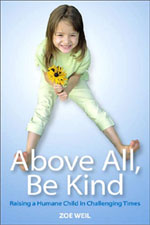 Editor’s Note: We are honored to publish the following guest post by Zoe Weil. Zoe is the President of the Institute for Humane Education (IHE) and author of Above All, Be Kind: Raising a Humane Child in Challenging Times and Most Good, Least Harm: A Simple Principle for a Better World and Meaningful Life.
Editor’s Note: We are honored to publish the following guest post by Zoe Weil. Zoe is the President of the Institute for Humane Education (IHE) and author of Above All, Be Kind: Raising a Humane Child in Challenging Times and Most Good, Least Harm: A Simple Principle for a Better World and Meaningful Life.
What’s the difference between niceness and kindness?
To me, niceness is pleasant but a bit anemic, lacking depth and character. It’s not something to strive for or cultivate in any powerful way, unlike kindness, which is worthy of our full attention and the dedication of our lives.
Being kind is a daily practice, not a static quality like niceness can be. While the nice person may avoid a conflict and not tell a hard truth, someone who is kind will search for the right words to share what may not be pleasant, but which may be helpful and loving.
I recently finished the novel, Olive Kittredge (which I highly recommend). Olive is definitely not nice. But sometimes she is profoundly kind. In one chapter, Olive meets a young anorexic woman, and her eyes brim with tears as she speaks truth to this young woman and ensures her care by calling her mother and helping her get treatment. Others had simply been nice to her.
Kindness differs from niceness in another way as well. Niceness is generally perceived as a proximal quality. We are nice to others with whom we come in contact. Kindness is both proximal and expansive. To be truly kind, we must make choices in our lives that do the most good and least harm to all those our decisions affect, no matter how scattered across the globe. This includes making decisions about our work, activism, and participation in democracy — as well as our lifestyle and dietary choices — with the good of all in mind. In an interconnected world, making such decisions requires daily attention. Being kind not only means helping a friend in need, but also supporting a stranger across the ocean whose life may be affected by your product choices, and bringing our talents to bear on solving systemic problems that perpetuate harm and destruction. Nice people don’t necessarily take all these factors into consideration. Kind people do.
Nice people are common, which is… nice. Truly kind people are relatively rare, largely because it takes such commitment, knowledge, and skill to be deeply, consistently kind. Kindness is hard work, but I’ve come to believe it’s the most important work of all. Will our children be successful? Do well at school? Will we get that coveted position and raise? Will we be able to take that desired vacation? We want these things so much, and we strive for them. Would that we would strive so diligently for kindness! Would that every parent would want their children to be kind above all else. Instead of telling our children to be nice, we need to give them the knowledge, tools, and motivation to be genuinely, persistently kind.
~ Zoe Weil
I really like how you’ve defined these two character traits and I totally agree that one can be kind without being considered a nice person. Great article!
wonderful article and an insightful distinction between niceness and kindness.